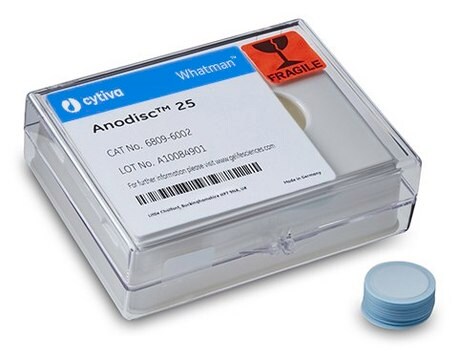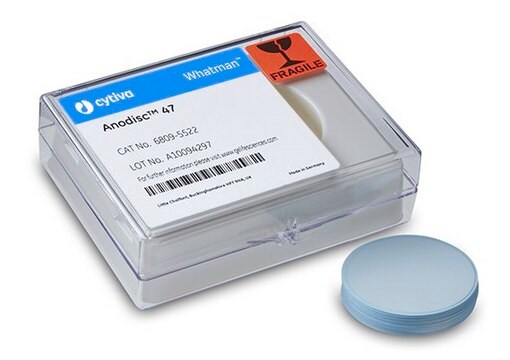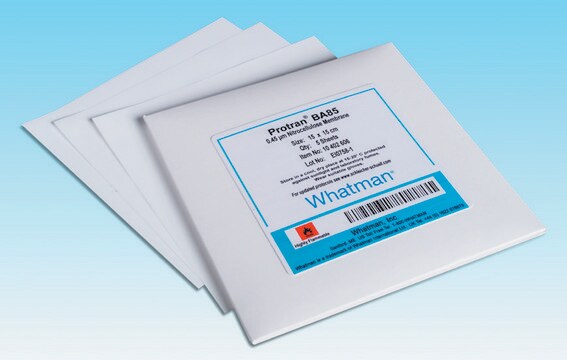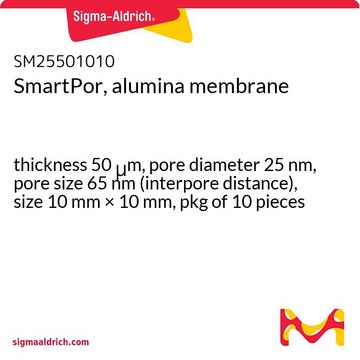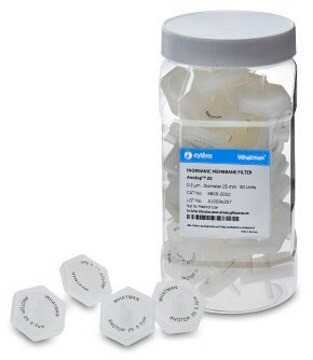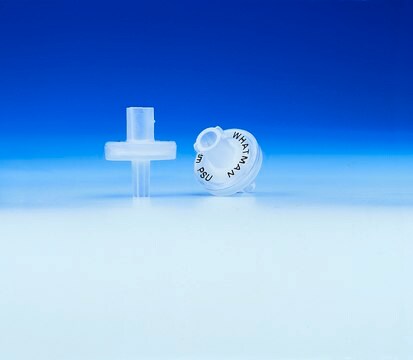WHA68096012
Whatman® alumina Anodisc filter discs 0.1 μm pore size
transparent, hydrophilic, PP support ring, 50 ea, 25 mm diam
Synonyme(s) :
Z694967, cellulose membrane, filter membranes, membrane filters
About This Item
Produits recommandés
product name
Whatman® Anodisc inorganic filter membrane, supported, diam. 25 mm, pore size 0.1 μm, autoclavable: no
Matériaux
alumina based membrane cap
Stérilité
non-sterile
Caractéristiques
autoclavable: no
Conditionnement
pkg of 50 ea
Fabricant/nom de marque
Whatman 6809-6012
Whatman Article No. 28420417 (US reference)
Diamètre
25 mm
Dimension de pores
0.1 μm
Vous recherchez des produits similaires ? Visite Guide de comparaison des produits
Description générale
The Anopore inorganic membrane (Anodisc) is well suited for a wide range of laboratory filtration applications. This novel material has a precise, nondeformable honeycomb pore structure with no lateral crossovers between individual pores, that filters at precisely the stated cut-off, allowing no larger sized particles to pass through the membrane. The Anopore inorganic membrane is composed of a high purity alumina matrix that is manufactured electrochemically. The membrane also exhibits low protein binding, has minimal autofluorescence, is nontoxic, and supports cellular growth.
The precise pore structure and narrow pore size distribution of the Anopore membrane ensure a high level of particle removal efficiency. Microorganisms and particulate material are captured on the surface of the membrane for subsequent analysis by light or electron microscopy. When wet, the membrane is virtually transparent, which means that retained particles do not need to be transferred to another surface before microscopic examination.
The membrane is hydrophilic and is compatible with most solvents and aqueous material. No monomers, plasticizers, adhesives, surfactants or wetting agents are used in the manufacturing process, which eliminates sample contamination and ensures low protein binding and minimal loss of sample.
Application
- HPLC mobile phase filtration and degassing
- Ultra cleaning of solvents
- Gravimetric analysis
- Liposome extrusion
- Scanning electron microscopy studies
- Bacterial analysis by epifluorescence light microscopy
- Micrometer and nanometer filtration
- Metal nanorods formation
Caractéristiques et avantages
- High pore density and narrow pore size distribution make it an extremely precise membrane.
- Wide solvent compatibility reduces the need to stock a variety of membranes in the laboratory.
- No additives used in the manufacturing process ensures minimal extractables and no sample contamination.
- Extremely low protein binding minimizes sample loss.
- Virtually transparent when wet making it highly suitable for microscopy studies.
Autres remarques
Informations légales
Faites votre choix parmi les versions les plus récentes :
Certificats d'analyse (COA)
Désolés, nous n'avons pas de COA pour ce produit disponible en ligne pour le moment.
Si vous avez besoin d'assistance, veuillez contacter Service Clients
Déjà en possession de ce produit ?
Retrouvez la documentation relative aux produits que vous avez récemment achetés dans la Bibliothèque de documents.
Les clients ont également consulté
Notre équipe de scientifiques dispose d'une expérience dans tous les secteurs de la recherche, notamment en sciences de la vie, science des matériaux, synthèse chimique, chromatographie, analyse et dans de nombreux autres domaines..
Contacter notre Service technique